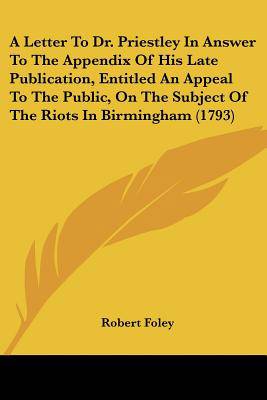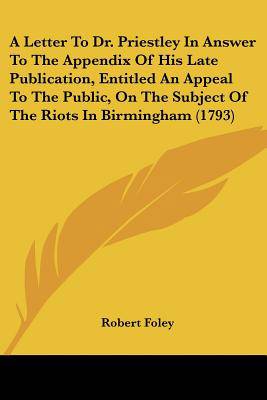
Door een staking bij bpost kan je online bestelling op dit moment iets langer onderweg zijn dan voorzien. Dringend iets nodig? Onze winkels ontvangen jou met open armen!
- Afhalen na 1 uur in een winkel met voorraad
- Gratis thuislevering in België vanaf € 30
- Ruim aanbod met 7 miljoen producten
Door een staking bij bpost kan je online bestelling op dit moment iets langer onderweg zijn dan voorzien. Dringend iets nodig? Onze winkels ontvangen jou met open armen!
- Afhalen na 1 uur in een winkel met voorraad
- Gratis thuislevering in België vanaf € 30
- Ruim aanbod met 7 miljoen producten
Zoeken
A Letter To Dr. Priestley In Answer To The Appendix Of His Late Publication, Entitled An Appeal To The Public, On The Subject Of The Riots In Birmingham (1793)
Robert Foley
Paperback | Engels
€ 27,45
+ 54 punten
Uitvoering
Omschrijving
""A Letter to Dr. Priestley in Answer to the Appendix of His Late Publication, Entitled An Appeal to the Public, on the Subject of the Riots in Birmingham"" is a book written by Robert Foley in 1793. The book is a response to Dr. Priestley's publication, in which he appealed to the public regarding the riots that occurred in Birmingham. The riots were a result of the tension between the Church of England and the Dissenters, who were followers of Priestley's Unitarianism. Foley's book provides a detailed account of the events that led to the riots and the aftermath. He argues that Priestley's publication was biased and did not present a fair representation of the events that took place. Foley also criticizes Priestley for his views on religion and politics, which he believes are dangerous and could lead to further conflict.The book is an important historical document as it provides insights into the religious and political tensions of the time. It also sheds light on the role of the press and public opinion in shaping events. The book is relevant today as it highlights the importance of freedom of speech and the dangers of intolerance and prejudice.To Which Is Added A Sermon. This scarce antiquarian book is a facsimile reprint of the old original and may contain some imperfections such as library marks and notations. Because we believe this work is culturally important, we have made it available as part of our commitment for protecting, preserving, and promoting the world's literature in affordable, high quality, modern editions, that are true to their original work.
Specificaties
Betrokkenen
- Auteur(s):
- Uitgeverij:
Inhoud
- Aantal bladzijden:
- 62
- Taal:
- Engels
Eigenschappen
- Productcode (EAN):
- 9781104595524
- Verschijningsdatum:
- 13/06/2009
- Uitvoering:
- Paperback
- Formaat:
- Trade paperback (VS)
- Afmetingen:
- 152 mm x 229 mm
- Gewicht:
- 95 g

Alleen bij Standaard Boekhandel
+ 54 punten op je klantenkaart van Standaard Boekhandel
Beoordelingen
We publiceren alleen reviews die voldoen aan de voorwaarden voor reviews. Bekijk onze voorwaarden voor reviews.











